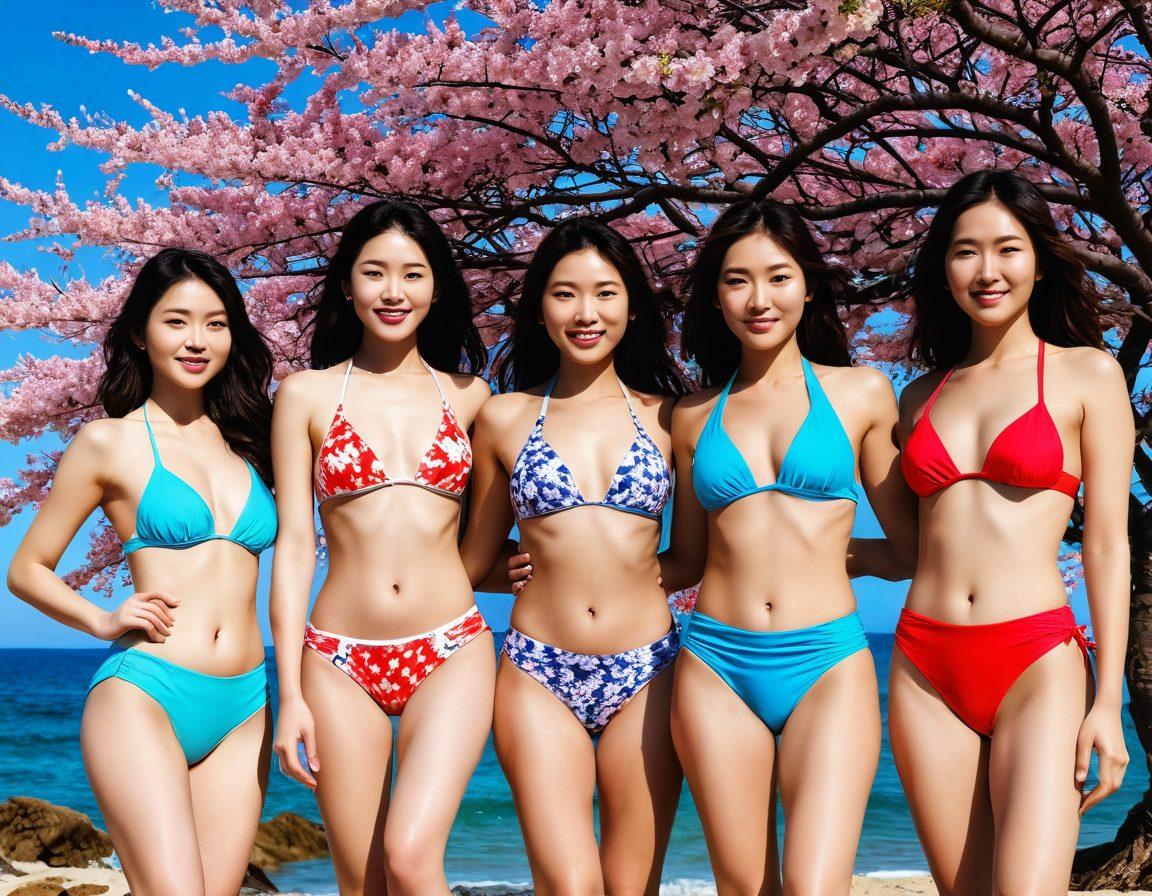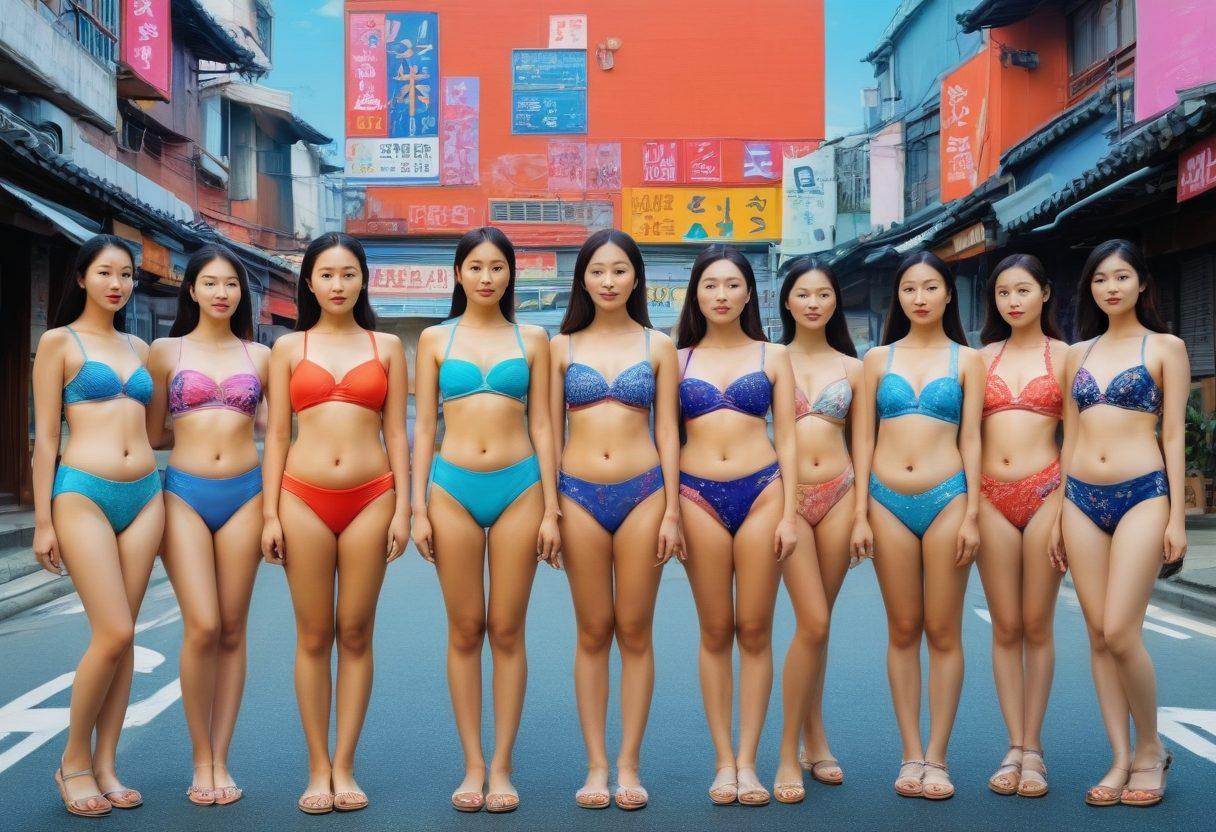Exploring the Intersection of Bikini Fashion and Psychological Wellness in South Korean Culture
Imagine strolling along the shimmering shores of Busan, the sun beaming down as people don their vibrant bikini fashion, exuding confidence and joy. This idyllic scene is more than just a typical beach day; it serves as a profound reflection of Korean mental health and the intersection of swimwear and psychological wellness. In South Korea, where societal pressures can weigh heavily, the act of wearing beachwear transforms beyond aesthetics—it's a medium of self-expression, empowerment, and mental liberation. As we dive deeper, we discover how Korean cultural studies have begun to unravel the intricate relationship between fashion, identity, and psychological well-being.
The psychology of fashion is a term that often brings to mind glamorous runways and trendsetters, but in the context of South Korean culture, it delves into the heart of personal identity and self-acceptance. With the rise of the bikini trend, there's been a vibrant evolution in how individuals perceive themselves during the summer months. 'What you wear is a reflection of who you are,' one might say, but in reality, it's often a barrier we break through. Understood through the lens of cognitive psychology, every time someone slips into a bikini, they might just be shedding layers of societal expectation—something that resonates deeply with the narratives in Asian psychology.
Have you ever pondered how your clothing choices might influence your mental well-being? For many Koreans, selecting swimwear can be an act of defiance against conventional beauty standards and a celebration of individuality. Swimming in the sea, adorned in their favorite bikinis, allows many to embrace mindfulness in psychology, grounding them in the present moment while letting the waves wash away their worries. This feeling of liberation reminds us of the wisdom from Maria Konnikova: 'The body is a canvas, and the self is the artist.' It's a perception that continues to flourish through psychosocial studies, showing how clothing acts as a conduit for empowerment and self-discovery.
In the framework of social psychology, one can observe how community and culture shape personal beliefs about body image, beauty, and acceptance. For instance, a day at the beach can create a symbiotic relationship between individuals, as they bond over shared experiences, occasionally even leading to shifts in perceptions of Korean social behavior. When everyone steps outside and embraces bikini fashion, it sends a strong message of body positivity, inspiring many to engage in healthy dialogues about mental well-being. The emergence of psychological research focusing on these dynamics reveals how fashion can enact change not just in individuals but also within the community, fostering resilience and encouragement amongst peers.
Ultimately, the transformative power of swimwear hinges on its ability to influence personal narratives and encourage conversations about mental health. As we witness the evolution of bikini fashion in South Korea, let's remind ourselves of the cultural influences on psychology, the significance of self-expression, and the ways swimwear empowers individuals to break free from societal constraints. So, next time you slip into your favorite bikini or beachwear, consider it an opportunity to embrace a collective journey towards improved mental well-being. Will you join the movement of transformation, self-acceptance, and joyful liberation?
Cultural Waves: Delving into the Connection Between Beachwear Choices and Psychological Wellness
Imagine walking along a sun-kissed beach, the sound of waves crashing around you. Now, picture the vibrant colors and styles of bikini fashion twinkling in the sunlight. This scene isn't just a feast for the eyes; it's an expression of deeper cultural phenomena that encapsulate the complexities of Korean mental health. How do beachwear choices influence psychological wellness? The intersection of bikini fashion and psychological well-being in South Korean culture is a captivating theme that invites exploration, urging us to consider the cultural influences on psychology and the expression of identity through swimwear.
Bikini fashion is not merely a trend but a reflection of societal norms and personal identity, especially within the realm of South Korean culture. The beauty standards and pressures faced by individuals can create a vibrant yet tumultuous relationship with swimwear. As we delve deeper into Korean cultural studies, it becomes clear that the choices people make at the beach often symbolize larger conversations surrounding body image and self-acceptance. How can examining these choices impact our understanding of Korean behavioral psychology and mental well-being?
Cognitive psychology informs us that what we wear impacts how we feel. A well-fitted bikini might evoke confidence, while a mismatched swimwear choice could trigger insecurities. In essence, our beachwear can be a barometer of our mental state, reflecting broader themes in social psychology. As it turns out, encouraging mindfulness in psychology can lead individuals to interpret their fashion choices as empowering rather than limiting. This is where psychological research on the psychology of fashion comes into play, shedding light on how clothing influences our emotions and self-perception.
Has the sun-soaked aura of South Korea’s beaches created a unique space for self-exploration through beachwear? Quite possibly! The psychological theories rooted in Korean social behavior link personal expression through clothing to broader sociocultural dynamics. Those enjoying the sun wearing a bikini might be flaunting not just their swimwear but their acceptance of oneself amidst societal pressures. The relationship is reciprocal; as swimwear styles evolve, so too does the conversation around psychological wellness and mental health, particularly in the realm of Asian psychology.
In the end, the relationship between bikini fashion and psychological wellness in South Korea is not just about what we see on the surface. By exploring the psychosocial studies that plumb these depths, we embrace a more holistic view of mental well-being—one that encompasses body image, personal identity, and cultural influences on psychology. As we move forward in understanding this dynamic, we invite you to ask yourself: How does your beachwear make you feel? What do your choices say about you, and how can they contribute positively to your psychological wellness?
Unraveling Identity: The Psychological Impact of Bikini Trends in South Korean Society
In the vibrant and rapidly evolving landscape of South Korean culture, the phenomenon of bikini fashion stands not just as a fleeting trend, but as a significant reflection of identity and psychological wellness. As swimwear becomes a canvas for expressing personal style and societal norms, we can't help but explore the intricate threads that tie bikini fashion to broader themes of mental well-being and identity. How do these colorful pieces of fabric influence our minds, and what does it mean to embrace the beachwear culture in a society that is both modern and steeped in tradition?
The world of swimwear reflects a myriad of emotions and social constructs. For many, donning a bikini can be empowering, a celebration of body confidence and self-acceptance. Yet, in the realm of South Korean culture, this choice often collides with deep-rooted expectations about beauty and acceptance. A captivating quote by the famous psychologist Carl Jung resonates here: "I am not what happened to me, I am what I choose to become." This idea of choice becomes crucial as more individuals navigate between societal pressures and personal desires in the context of bikini fashion.
Imagine walking down a busy beach, feeling the warmth of the sun and the cool ocean breeze, each wave symbolizing a step closer to self-acceptance. However, for many, the act of wearing swimwear can evoke feelings of anxiety and self-doubt. Statistics reveal that South Korea ranks high in mental health challenges, with societal standards playing a pivotal role in the perceptions of self-worth. Observing how significantly Korean mental health intertwines with the psychology of fashion can spark conversations—are we shaped by what we wear, or do we shape our fashion to mirror who we are? By exploring cognitive psychology and its intersection with swimwear, we unveil layers of identity that resonate across cultures.
As we delve deeper, it’s crucial to understand the influence of Korean behavioral psychology on swimwear choices. Korean cultural studies suggest that garments like bikinis can serve as both a shield and a mirror, representing an individual’s state of mind. For example, during the summer months, an increase in bikini trends often correlates with shifts towards a more open, carefree attitude— a sign of mindfulness in psychology that celebrates individuality, despite collective societal pressures. On the flip side, this trend also opens floodgates of criticism, showcasing the dual nature of fashion as a means of liberation yet simultaneously becoming a subject of judgment.
To fully appreciate the correlation between bikini fashion and psychological wellness, we must acknowledge the cultural influences on psychology that shape South Korean society. Social psychology helps us navigate how group norms influence personal choices, and it is clear that the bikini, as part of beachwear, stands at the crossroads of innovation and tradition. The psychological theories elaborate on personal versus collective identity, urging us to ponder: How can we reconcile the dichotomy of self-expression through fashion with the demands of social conformity? As the conversation around psychological research widens within the realm of swimwear, it becomes apparent that embracing the bikini trend can be much more than a fashion decision; it’s a critical step towards understanding oneself and fostering mental well-being in a world that constantly demands transformation.


